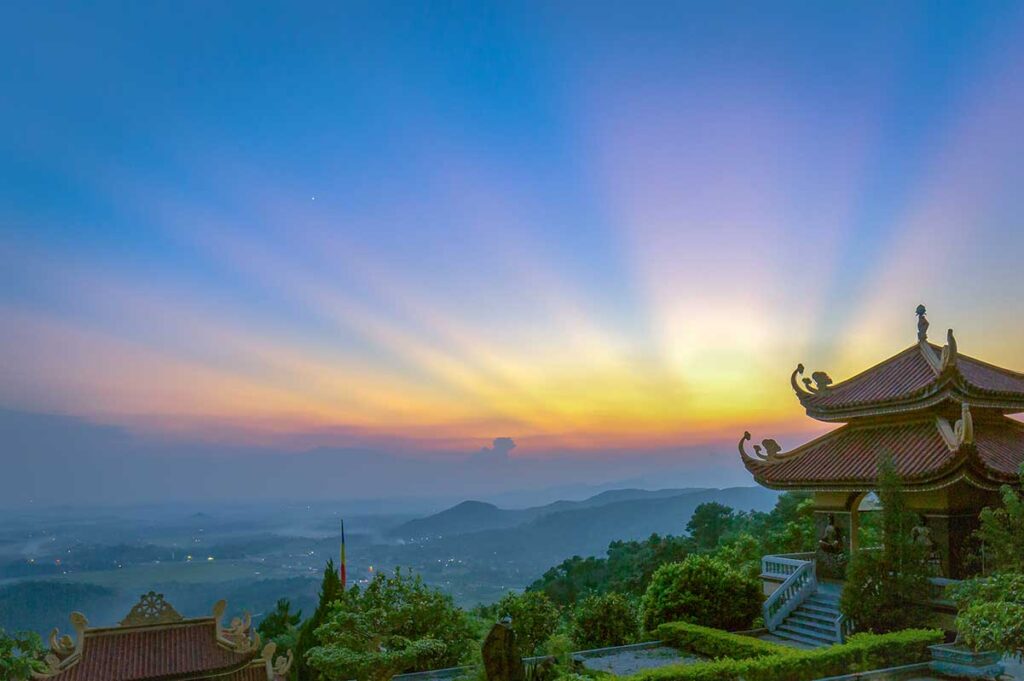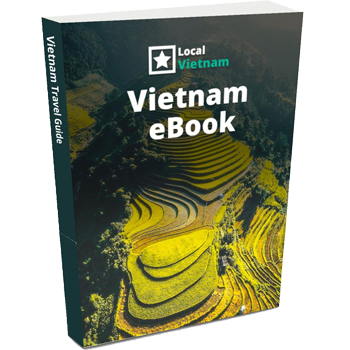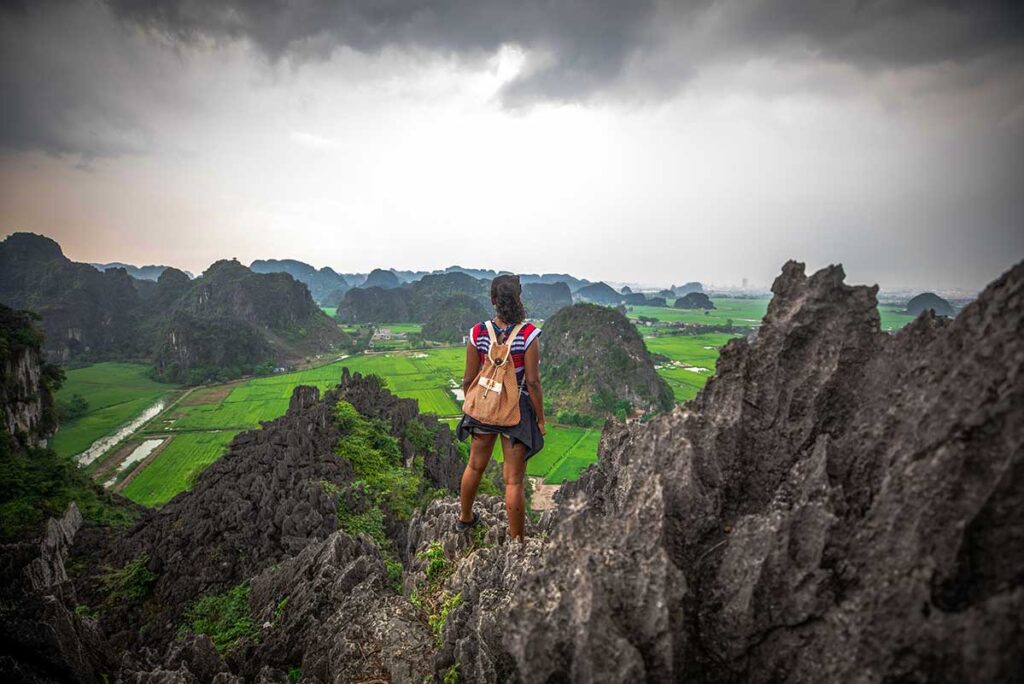What is Tay Thien Pagoda & Zen Monastery?
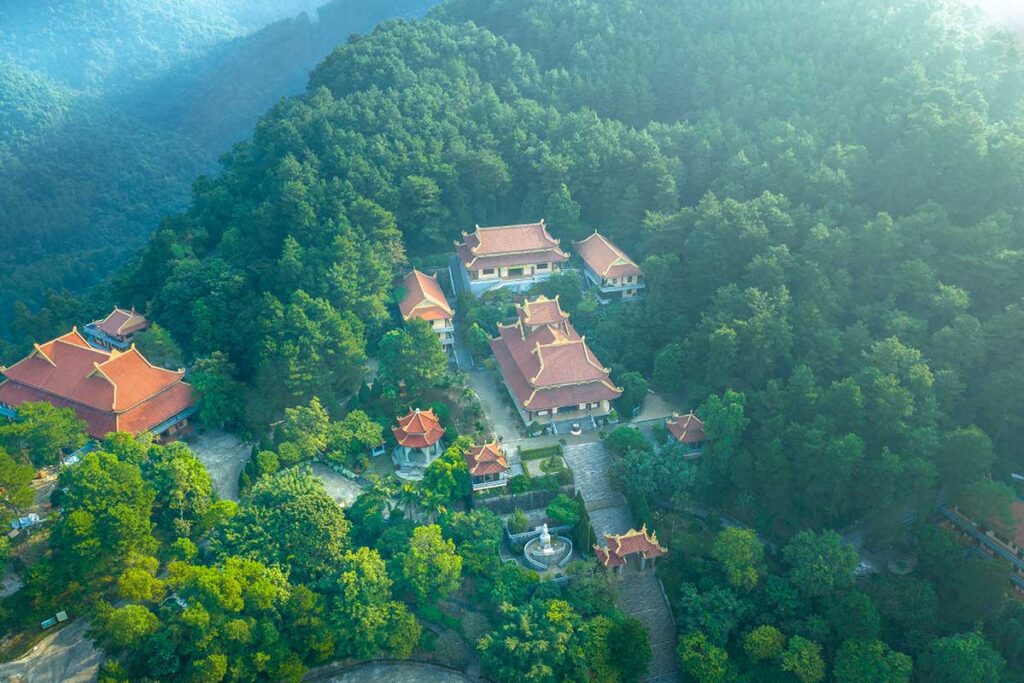
Tay Thien Pagoda is a spiritual complex in Tam Dao district, Vinh Phuc province, considered one of Vietnam’s major Buddhist centers and pilgrimage sites. Set on the slopes of Thach Ban mountain, the area combines ancient temples, shrines, and legends with newer constructions such as the Truc Lam Zen Monastery and the Mandala Great Stupa. For visitors, it offers both a traditional pilgrimage experience and the chance to join meditation retreats in a peaceful mountain setting.
History of Tay Thiên
Early Buddhism in Vietnam
According to tradition, Tay Thien is one of the first places where Buddhism arrived in Vietnam. A monk from India is said to have chosen this mountain around the 3rd century BC as a site to spread Buddhist teachings. While it’s difficult to verify the exact history, the association makes Tay Thien an important symbolic origin point for Vietnamese Buddhism.
The Legend of Quoc Mau Lang Thi Tiêu
Local legend connects Tay Thien not only to Buddhism but also to Mother Goddess worship. Lang Thi Tieu, a woman of extraordinary intelligence and martial skill, is said to have helped the Hung Kings defend the country against invaders. After her death, she was honored as the “Nation Mother” and worshiped at temples on the mountain. To this day, many Vietnamese pilgrims climb to Tay Thien to pay respect to both the Buddha and the Mother Goddess.
Pilgrimages and Temples over Time
For centuries, Tay Thiên became a pilgrimage destination where Buddhist worship blended with Mother Goddess traditions. Small temples, shrines, and pagodas were built across the mountain slopes. Many of these have been destroyed and rebuilt over time, but the spirit of pilgrimage continues, especially during spring festivals in the second lunar month.
Modern revival
In 2005, the Trúc Lâm Tay Thiên Zen Monastery was established near the foot of the mountain. Built on the site of the old Thiên An Thiên Tự pagoda, it has become one of Vietnam’s largest Zen centers, hosting retreats and summer training for young Buddhists. Its construction reflects both a revival of Buddhist practice in the area and an effort to give Tay Thiên a more formal role in Vietnam’s modern spiritual life.
Highlights of Tay Thiên Pagoda Complex
1. Great Mandala Stupa
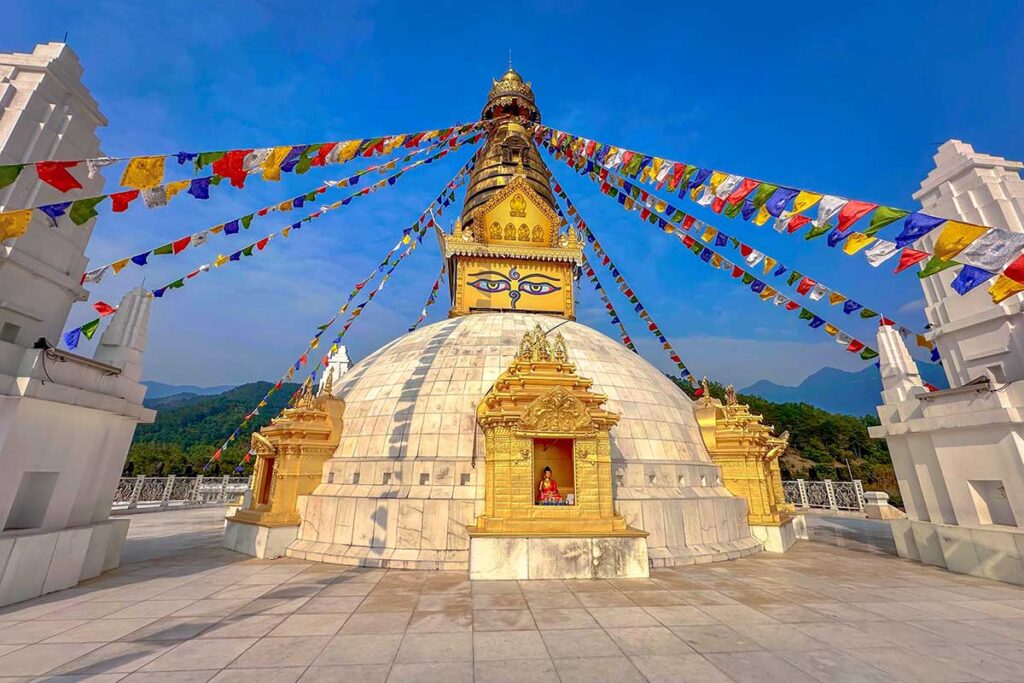
At the foot of the mountain stands the Mandala Great Stupa, one of the newest constructions in the complex. Its design follows Tibetan and Nepalese styles, with a large white dome topped by a golden spire—quite different from the tower-shaped stupas you often see elsewhere in Vietnam. It’s worth a short stop for photos and to appreciate the unusual architecture, though spiritually it feels more modern than ancient.
2. Entrance Gate & Stupa Area
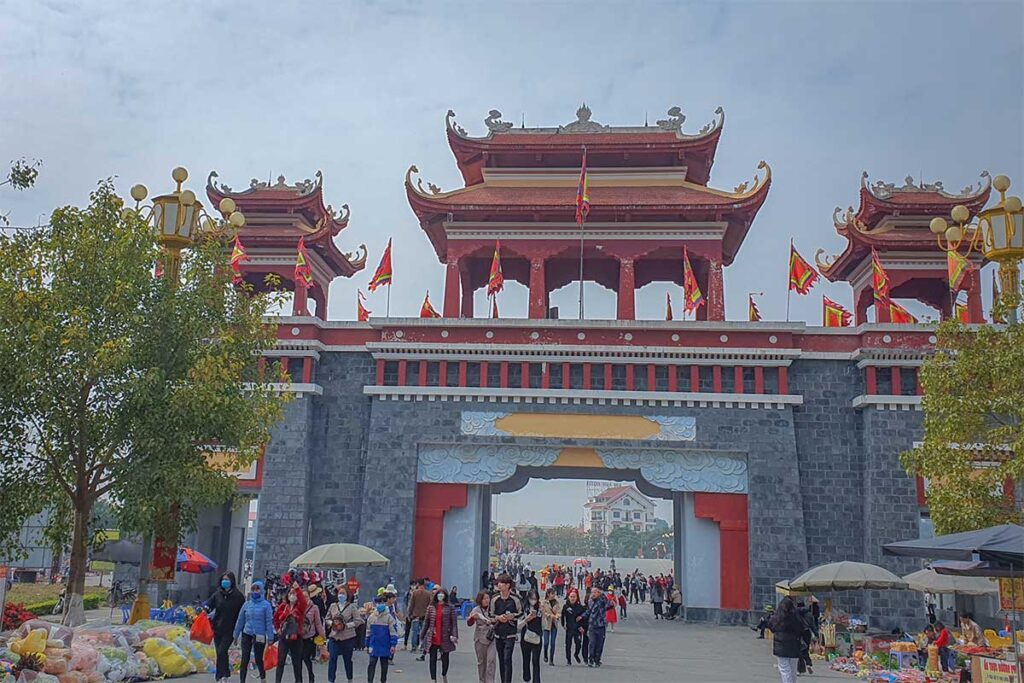
A large ceremonial gate marks the beginning of the Tay Thien complex, near the main parking area. While it looks impressive, it’s relatively new and mostly symbolic—a marker that you’ve arrived at the starting point of the pilgrimage route.
3. Thong Temple
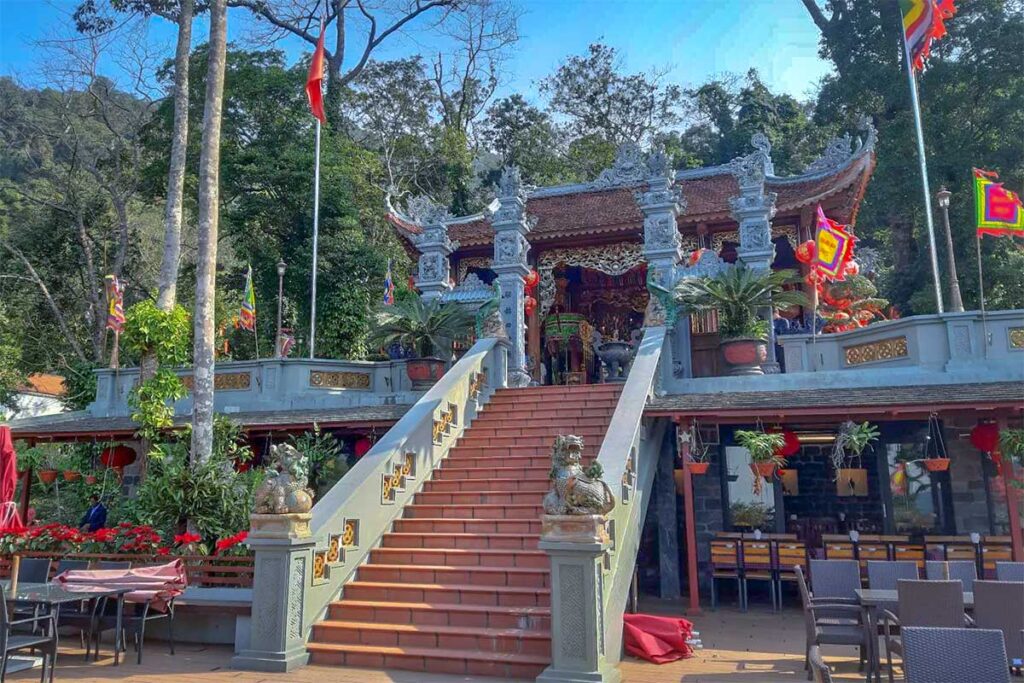
Thong Temple sits closer to the mountain slopes and is usually the first meaningful stop on the route. Dedicated to the Mother Goddess, the temple is surrounded by a large banyan tree and an old stone stele marking Tay Thien as a sacred site. It feels more atmospheric than the newer constructions and gives you a sense of the site’s deeper traditions.
4. Cable Car Station
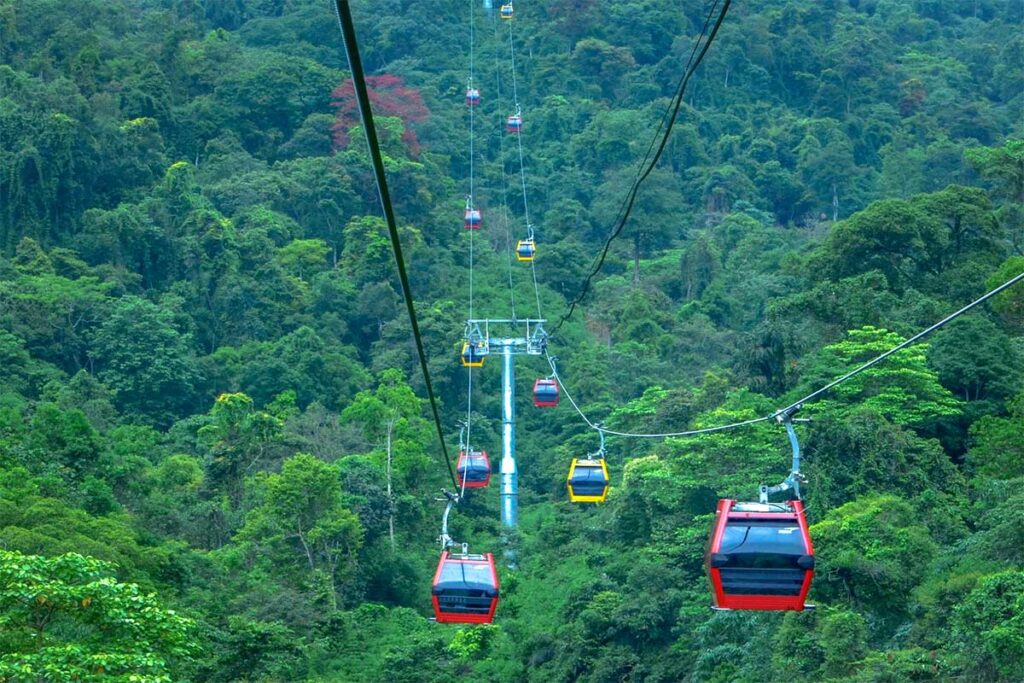
Just behind Thong Temple you’ll find the cable car station, which saves visitors the steep hike up the mountain. The ride takes about 10 minutes and covers 2.5 kilometers, gliding above forested slopes and streams. It’s convenient if you’re short on time, but the experience is more functional than scenic compared to cable cars in other parts of Vietnam.
5. Hiking Route
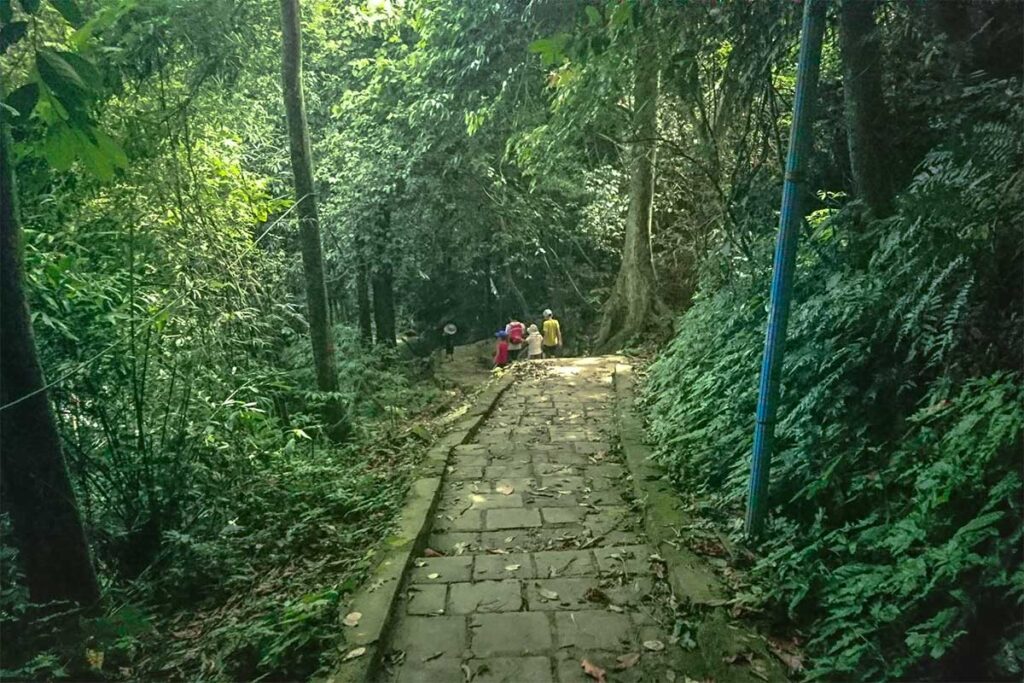
If you prefer walking, a 4–6 km hiking trail climbs from the base to the main pagoda in about 2–3 hours. The path passes through forest, small shrines, and streams, with occasional steep stretches. Along the way you’ll come across the Fairy Chessboard—literally just a cement square painted like a chessboard on a rock. Reviews often describe it as underwhelming, so don’t expect too much beyond a quirky landmark.
6. Co & Cau Temples
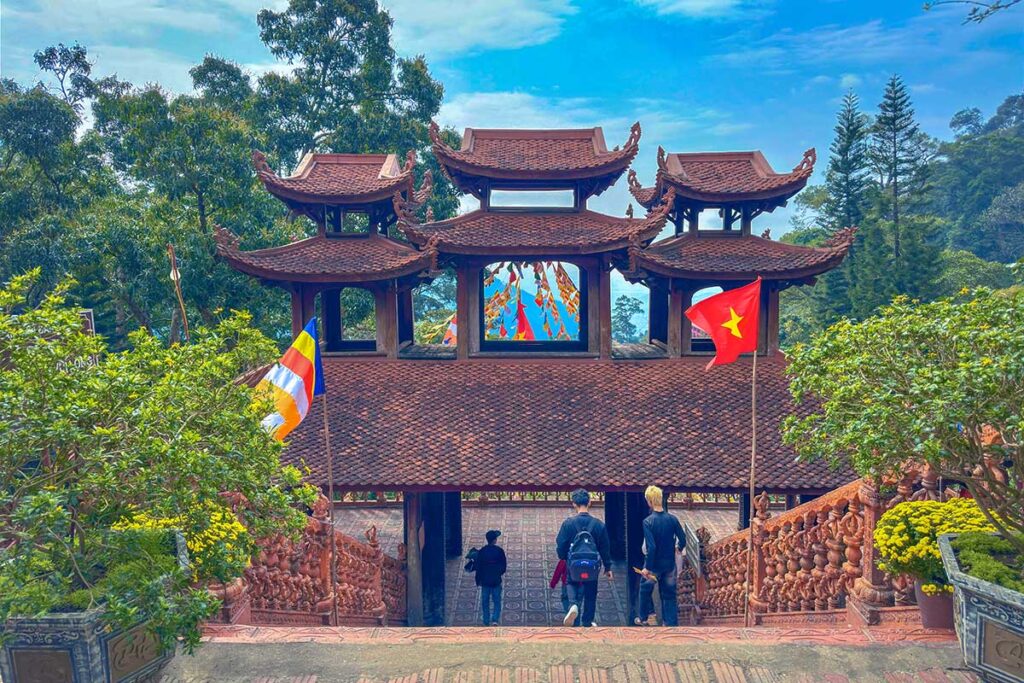
Further along the trail are the paired Co (Lady) and Cau (Gentleman) Temples. These small shrines are where people come to pray for love, marriage, and family fortune. They’re simple but add to the cultural atmosphere of the pilgrimage, and they’re usually quiet stops compared to the main pagoda.
7. Truc Lam Tay Thien Zen Monastery
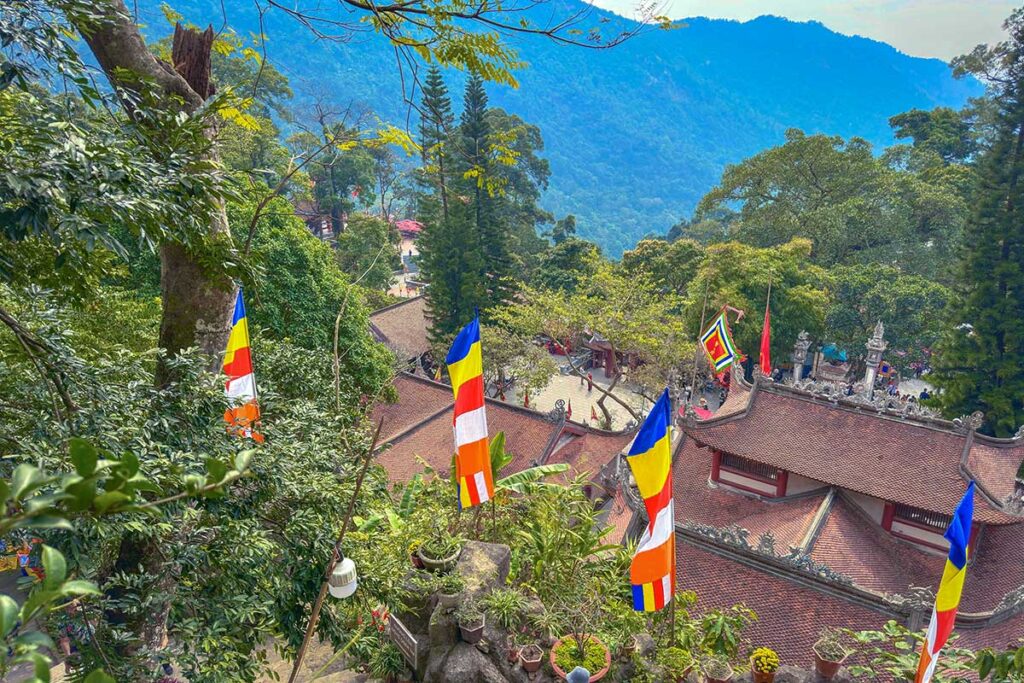
Higher up the mountain sits the Truc Lam Tay Thien Zen Monastery, one of the largest Zen monasteries in Vietnam. Built in 2005, it’s a big, modern complex with wide courtyards, meditation halls, and guest facilities. While it lacks the aged character of older temples, it’s impressive in scale and is the heart of meditation retreats that many visitors choose to join.
8. Silver Waterfall (Thác Bac)
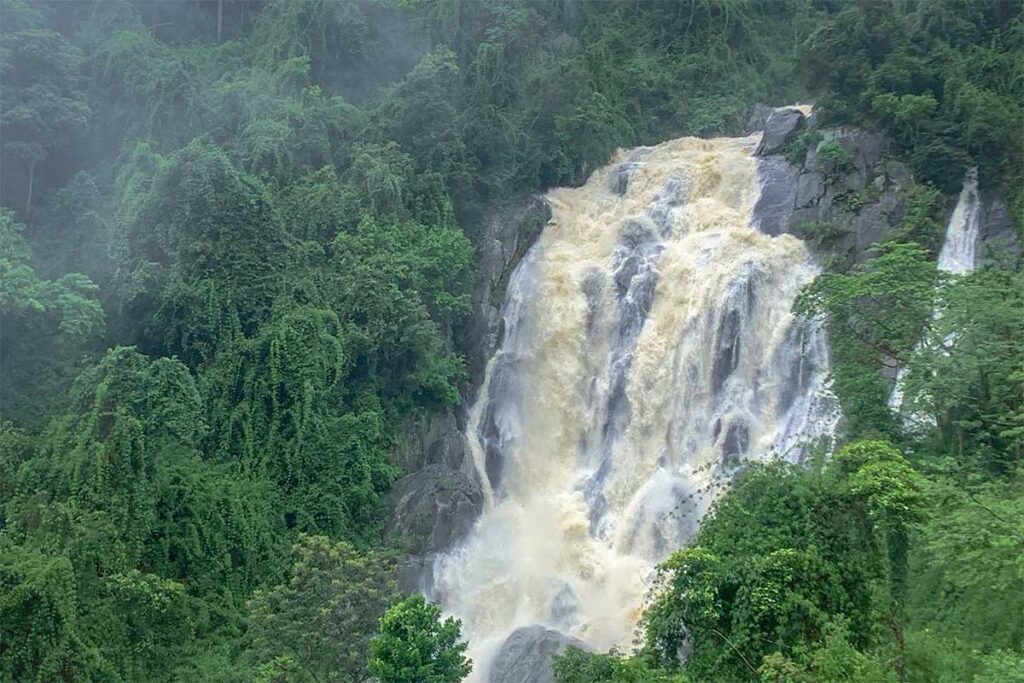
Near the upper part of the complex is Silver Waterfall, a three-tier cascade hidden in the forest. The rocks here are streaked with a bluish-green hue, which makes the setting quite striking. The path can be slippery, especially at the top, so good footwear is essential. It’s one of the more natural highlights of Tay Thien and a refreshing break from the temples.
9. Nature & Mountain Views
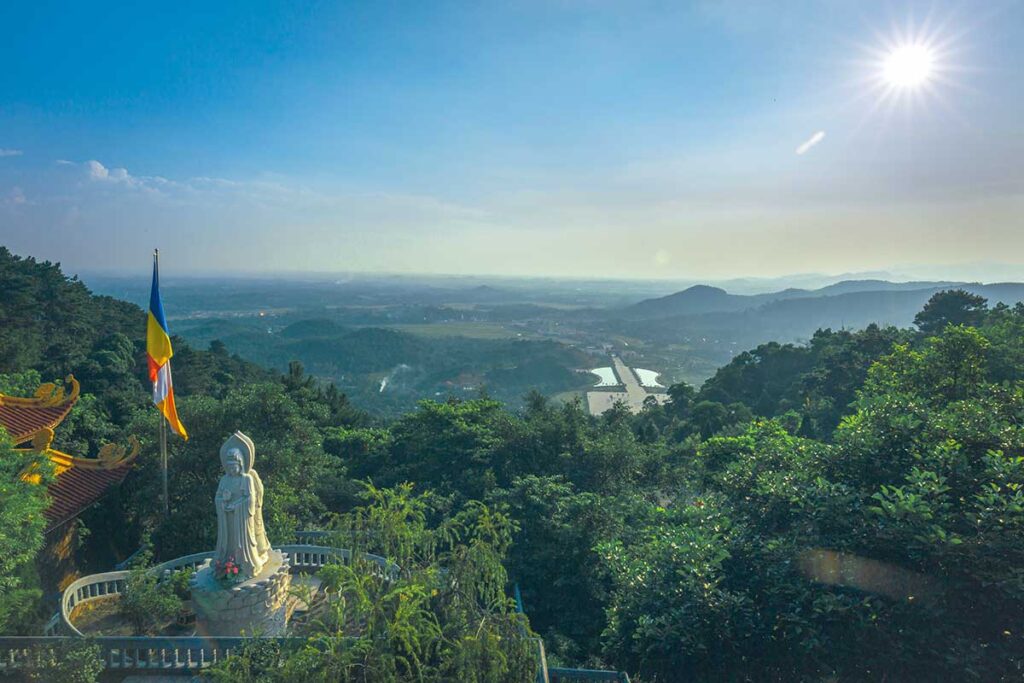
One of the real highlights of Tay Thien is the natural setting itself. The walk takes you through forested slopes, past streams and old stone paths, with cool mountain air that feels like a retreat from the lowlands. Reaching the upper temples and monastery, you’re rewarded with wide views across the Tam Dao range—on clear days the valleys stretch endlessly into the distance. The combination of peaceful nature and sweeping panoramas adds as much to the experience as the temples themselves.
Staying & Meditation retreat
The Truc Lam Tay Thien Zen Monastery allows visitors, including foreigners, to stay overnight and join the daily routine of the monks. Accommodation is basic but clean, usually in shared dorms or small rooms, and all meals are vegan. The schedule starts early with meditation and chanting, includes simple work sessions like gardening or cleaning, and ends with evening practice. Participation is encouraged but flexible, so both newcomers and experienced meditators can feel comfortable.
Life at the monastery is peaceful and communal, with an emphasis on mindfulness in both practice and daily tasks. Stays are donation-based rather than charged, and visitors are treated as temporary members of the community rather than tourists. It’s not a luxury retreat, but for those seeking an authentic and immersive spiritual experience in northern Vietnam, a few days here can be deeply rewarding.
Visiting information
Opening Hours
The Tay Thiên area is generally open daily. Temples and shrines can usually be visited from early morning until late afternoon, though the monastery is more active during daylight hours and overnight stays must be arranged directly with the monks. The cable car and electric shuttle services typically run from around 7:00 am to 5:00 pm.
Entrance Fees
There is no entrance fee for the temples or the Zen monastery. However, visitors will need to pay for on-site transport if they use it.
- Electric shuttle (from outer gate to ticket counter or cable car station): about 40,000 VND per person round-trip.
- Cable car tickets:
- Round trip – Adults: 240,000 VND, Children: 160,000 VND.
- One way – Adults: 150,000 VND, Children: 100,000 VND.
- Children under 1m tall: free.
Dress Code
Wear modest clothing that covers shoulders and knees. Bright or flashy outfits are best avoided, as Tay Thien is an active place of worship.
Location
Tay Thiên is located in Đại Đình Commune, Tam Đảo District, Vĩnh Phúc Province, about 70 km (two hours) northwest of Hanoi. It sits on the slopes of the Tam Đảo mountain range, separate from Tam Đảo town and the main entrance to Tam Đảo National Park.
How to get there
From Hanoi
The distance from Hanoi to Tay Thiên is around 70 km, and the trip takes about two hours. There are several ways to get there:
- Private car or taxi – The most convenient option. Expect to pay a fixed fare for the round trip if you hire a driver from Hanoi. This is the easiest way if you are short on time or traveling in a group.
- Motorbike – Adventurous travelers sometimes ride themselves, following the Hanoi – Nhat Tan Bridge – Vinh Yen – Dai Dinh route. Roads are paved but busy near the city. It’s better for confident drivers.
- Bus + local connection – In theory, you can take a Hanoi–Vinh Yen bus, then transfer to local buses or taxis. In practice, connections are infrequent and poorly marked, so this option is not recommended unless you speak some Vietnamese.
Practical considerations
Public transport to Tay Thiên is limited, and most foreign visitors find it easier to arrange a private transfer or join a day trip tour from Hanoi. Travel by motorbike or car gives flexibility to also visit nearby areas, such as Tam Đảo town.
Nearby attractions
Tam Dao Town
About 15 km from Tay Thien lies Tam Dao town, a small hill resort established during the French colonial era. It has cool mountain air, a ruined stone church, scattered French villas, and several cafés with good viewpoints over the valleys. It’s a pleasant place for a short stop, though facilities are limited compared to larger mountain towns like Sapa.
Tam Dao National Park
Tay Thien is part of the wider Tam Dao National Park, which offers hiking trails and panoramic viewpoints. The forested mountains are scenic, but the park is not as well-developed or as striking as other northern destinations such as Ba Be or Cuc Phuong. It can still make for a good nature break if you’re already in the area.
For a broader look at what the province has to offer—such as lakes, temples, and lesser-known nature spots—you can check our complete guide to Vinh Phuc.
Is it worth visiting?
For pilgrims and practicing Buddhists, Tay Thiên is a meaningful destination. The upper pagoda complex honors Quốc Mẫu Lang Thị Tiêu and draws large crowds during spring festivals, while the Trúc Lâm Zen Monastery offers an authentic environment for meditation retreats. For travelers interested in Buddhism, the chance to stay at the monastery and follow the daily life of monks is rare in Vietnam and can be a rewarding experience.
For casual tourists, the appeal is more limited. The cable car ride, mountain scenery, and Mandala Great Stupa are pleasant, but the temples themselves are not among Vietnam’s most impressive. Tay Thiên is also remote and difficult to combine with other attractions apart from Tam Đảo town, so it usually isn’t a top priority unless you are specifically looking for a spiritual or offbeat experience.
